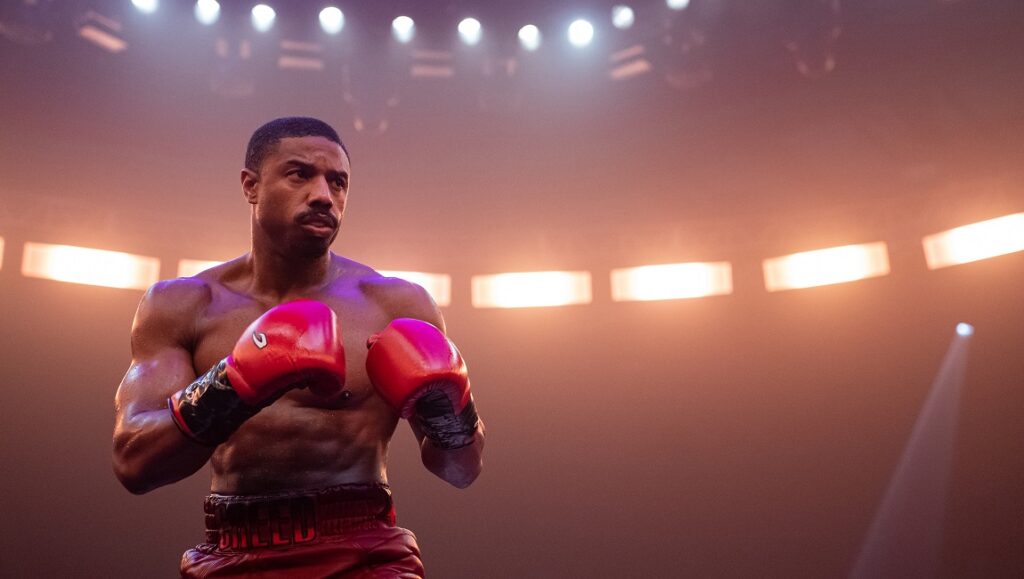Creed III continues to mirror the trajectory of its parent Rocky franchise. The first one was a dare-you-say transcendent recapitulation of the original film’s working-class inspirational sports story about a young (and this time Black) man coming to understand his own political capital. Creed II tossed most of that aside: our hero Adonis (Michael B. Jordan), like Rocky Balboa before him, became merely the arrogant champion, this while the much more interesting story of his opponent got pushed to the background. Now, with this third entry, we get closer to Rocky III, in which the complacent hero must fight someone who has a legitimate beef to battle for so that he can maintain his masculine pride.
Adonis is flourishing in retirement from fighting. He’s rich and successful, his family is thriving; his wife Bianca (Tessa Thompson) is a renowned music producer, and his daughter Amara (Mila Davis-Kent) wants to take up boxing. But out of Adonis’ past comes an old face, that of Damian Anderson (Jonathan Majors), a childhood friend who took the fall for an act of violence committed when they were teenagers and has been in prison for 18 years. Originally the more promising fighter, Damian has only honed both his skills and his anger in the joint, and now he wants Adonis to get him a title match out of the gate.
You’d think Adonis would turn to his mentor Rocky for a little advice here, but pretty much any mention of Sylvester Stallone’s character has been conspicuously scrubbed from the film for whatever reason. In any case, it isn’t long before some suspicious circumstances give Damian exactly the opportunity he demands, and when he unsurprisingly finds himself champion, his larger agenda of revenge on his old friend snaps into view for Adonis, even though the audience could have smelled it from a mile off. Adonis will, of course, eventually have to come out of retirement to fight him, and the movie sets about its bland trajectory of explaining how violence doesn’t solve anything, except when it does.
It’s a banal choice made even emptier by being contrasted with Adonis’ domestic concerns. Bianca has been even further reduced to a merely worried spouse, occasionally one who warns that her husband’s values are a little out of whack. Daughter Amara is violently lashing out at school (against a smarmy bully who absolutely deserves it, but whatever), and we’re to waffle about whether or not she needs to learn to defend herself. These are all moot questions; we’re watching a fucking boxing movie. The central conflict of enmity between the two leads falls apart here: Damian has had his life stolen from him, either by Adonis’ negligence or by a terrible carceral system, and he’s got a completely reasonable argument. Adonis feels guilty, but dismisses Damian’s anger. Whether or not either fighter wins in the end, the emotional conflict is unresolvable in the ring, except, spoiler alert, the two men eventually make up after the bout for no discernible reason.
Setting narrative aside, though, the most novel element here is that star Jordan has taken over the directing gig. It’s largely a competent job. Although he doesn’t do much to elevate the formal work in the dramatic scenes, it’s clear that he’s spent a lot of time with his performers. Majors brings a really fearsome aggression to the role, as well as wearing his intense self-pity almost like a second skin. He’s a remarkable actor, and he’s doing quite fine work here. But it’s in the boxing sequences that Jordan has made some interesting choices. The fights boast a distinct emphasis on technique and speed. They may not be the elegant long takes that occasioned the first Creed, but there’s a ferocity on display here that’s both refreshing and appropriate to the story.
As these movies go forward, they look more and more like the generic entries in the franchise they’re spun off from, and maybe that’s okay; nobody ever got too mad at the Rockys for being run-of-the-mill crowd-pleasers. But there’s so much richness to the world depicted in the Creed franchise, so much available to dissect about Black masculinity, class distinctions, racial conflicts, capitalism, on and on, that it’s increasingly disappointing to see those aspects — which were so present initially — get pushed aside.
Published as part of InRO Weekly — Volume 1, Issue 9.


Comments are closed.